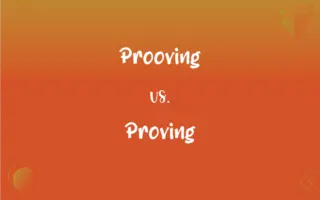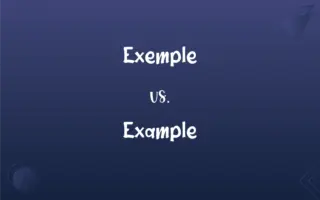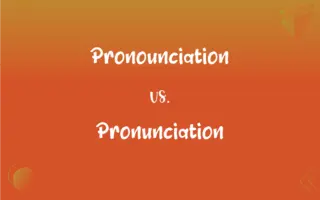Seperating vs. Separating: Mastering the Correct Spelling
Edited by Aimie Carlson || By Janet White || Updated on March 12, 2024
"Seperating" is an incorrect spelling of the correct term "Separating," which describes the action of dividing or distinguishing between two or more things.

Which is correct: Seperating or Separating
How to spell Separating?

Seperating is Incorrect

Separating is Correct
ADVERTISEMENT
Key Differences
Use a mnemonic: "Separate a rat" to remember that 'a' follows 'e' and precedes 'r.'
Mentally divide the word into syllables: sep-a-rat-ing.
Think of the word "separate," from which "separating" is derived, to remember the 'a' in the middle.
Connect it to similar words like "operation" that use an 'a' before the 't.'
"Separating" has two 'a's; the second 'a' comes before the 't.'
ADVERTISEMENT
Correct usage of Separating
Separating the two materials proved to be a challenge.
The teacher discussed the importance of seperating facts from opinions.
The teacher discussed the importance of separating facts from opinions.
She had trouble seperating her personal and professional life.
She had trouble separating her personal and professional life.
Separating the mixture into its individual parts required precision.
The process of seperating the components was complex.
The process of separating the components was complex.
Separating Definitions
Separating can mean becoming distinct or isolated from something else.
The oil is separating from the water in the mixture.
Separating involves setting or pulling things apart from each other.
She is separating the laundry into darks and lights.
Separating can mean forming a barrier or division between things.
A fence is separating the two properties.
Separating refers to disconnecting or disengaging components.
He is separating the two fighting dogs.
Separating also describes isolating something for closer study or scrutiny.
The chemist is separating the substances for analysis.
To set, force, or keep apart
The referee separated the two boxers.
To put space between; space apart or scatter
Small farms that were separated one from another by miles of open land.
To form a border or barrier between (two areas or groups)
A hedge separates the two yards.
To place in different groups; sort
Separate mail by postal zones.
To differentiate or discriminate between; distinguish
A researcher who separated the various ethnic components of the population sample.
To cause to be distinct or different
His natural talent separates him from all the others in the choir.
To remove from a mixture or combination; isolate.
To cause (one person) to stop living with another, or to cause (a couple) to stop living together, often by decree
She was separated from her husband last year. The couple have been separated for a year.
To terminate a contractual relationship with (someone); discharge.
To come apart; become detached
The lining has separated from the inside of the coat.
To withdraw or break away
The state threatened to separate from the Union.
To part company; go away from each other; disperse
The friends separated at the end of the school year.
To stop living together as a couple
They separated after 10 years of marriage.
To become divided into components or parts
Oil and water tend to separate.
Not touching or adjoined; detached
The garage is separate from the house.
Existing or considered as an independent entity
The reference collection is separate from the rest of the library.
Dissimilar from all others; distinct or individual
A cable made of many separate fibers.
Two people who hold separate views on the issue.
Often Separate Having undergone schism or estrangement from a parent body
Separate churches.
A garment, such as a skirt, jacket, or pair of slacks, that may be purchased separately and worn in various combinations with other garments.
A stereo component that is purchased separately and connected to other components as part of a system.
An offprint of an article.
An instance of separating.
Capable of being opened and having its two sided completely detached from one another rather than just being opened for most of its length.
Designed or employed to separate.
Separating Sentences
He found separating the twins for school helped their individual growth.
Separating work from leisure time can be difficult when working from home.
The machine is capable of separating the seeds from the fruit.
After separating the ingredients, she started to cook.
During the experiment, they focused on separating the chemical compounds.
The fence was used for separating the two properties.
Separating fact from fiction is crucial when researching.
The bookshelf served the dual purpose of holding books and separating the room.
Separating the recycling from the trash is important for the environment.
He had a system for separating his expenses into categories.
Separating the art supplies by type makes it easier to find what you need.
She spent the afternoon separating the clothes into keep and donate piles.
Separating personal feelings from professional decisions is often advised.
The river is known for separating the two countries.
Separating yourself from negative influences can improve your well-being.
The new policy aims at separating waste at the source.
Separating the good from the bad is not always black and white.
The process involves separating the metals from the ore.
Separating emotions from decisions can lead to more rational outcomes.
The storm ended up separating the ship from its anchor.
The software helps in separating the data into different segments.
In cooking, separating eggs means dividing the yolks from the whites.
They discussed the merits of separating students by ability level.
After separating from the group, he got lost.
The challenge involves separating the salt from the sand.
FAQs
What is the pronunciation of Separating?
Pronounced as /ˈsɛpəˌreɪtɪŋ/.
What is the root word of Separating?
The root word is "separate."
Why is it called Separating?
It's called "Separating" to describe the act of setting or pulling things apart.
What is the plural form of Separating?
There is no plural form of "Separating" as it is a verb or gerund.
Which preposition is used with Separating?
"From," as in "separating the grain from the chaff."
Which article is used with Separating?
"The" can be used, as in "the separating mechanism."
Is Separating an abstract noun?
When used as a gerund, it can be considered abstract.
Which vowel is used before Separating?
The vowel 'e' is used before "Separating."
What is the verb form of Separating?
The verb form is "separate."
Is Separating an adverb?
No, it is not an adverb.
Is Separating a negative or positive word?
It is neutral but can have positive or negative connotations based on context.
Which conjunction is used with Separating?
"And," as in "separating and categorizing."
What is another term for Separating?
Another term is "dividing."
What is the singular form of Separating?
"Separating" is already in singular form; it's a verb or gerund.
Is Separating a noun or adjective?
It can act as a verb or a gerund (noun).
Is the word Separating imperative?
It can be used in the imperative mood ("Start separating the items!")
How do we divide Separating into syllables?
Sep-a-rat-ing.
Which determiner is used with Separating?
"The" can be used, as in "the separating process."
What is the first form of Separating?
"Separate."
What is the third form of Separating?
"Separated."
Is Separating a countable noun?
No, when used as a gerund, it is uncountable.
Is Separating a collective noun?
No, it is not a collective noun.
What is the opposite of Separating?
The opposite is "combining" or "joining."
How is Separating used in a sentence?
"She is separating the recyclables from the trash."
Is Separating a vowel or consonant?
It starts with a consonant ('S').
Is the Separating term a metaphor?
It can be used metaphorically.
How many syllables are in Separating?
Four syllables.
What is a stressed syllable in Separating?
The first syllable, "Sep," is stressed.
What part of speech is Separating?
It is a verb or a gerund (noun).
What is the second form of Separating?
"Separated."
About Author
Written by
Janet WhiteJanet White has been an esteemed writer and blogger for Difference Wiki. Holding a Master's degree in Science and Medical Journalism from the prestigious Boston University, she has consistently demonstrated her expertise and passion for her field. When she's not immersed in her work, Janet relishes her time exercising, delving into a good book, and cherishing moments with friends and family.
Edited by
Aimie CarlsonAimie Carlson, holding a master's degree in English literature, is a fervent English language enthusiast. She lends her writing talents to Difference Wiki, a prominent website that specializes in comparisons, offering readers insightful analyses that both captivate and inform.


































































